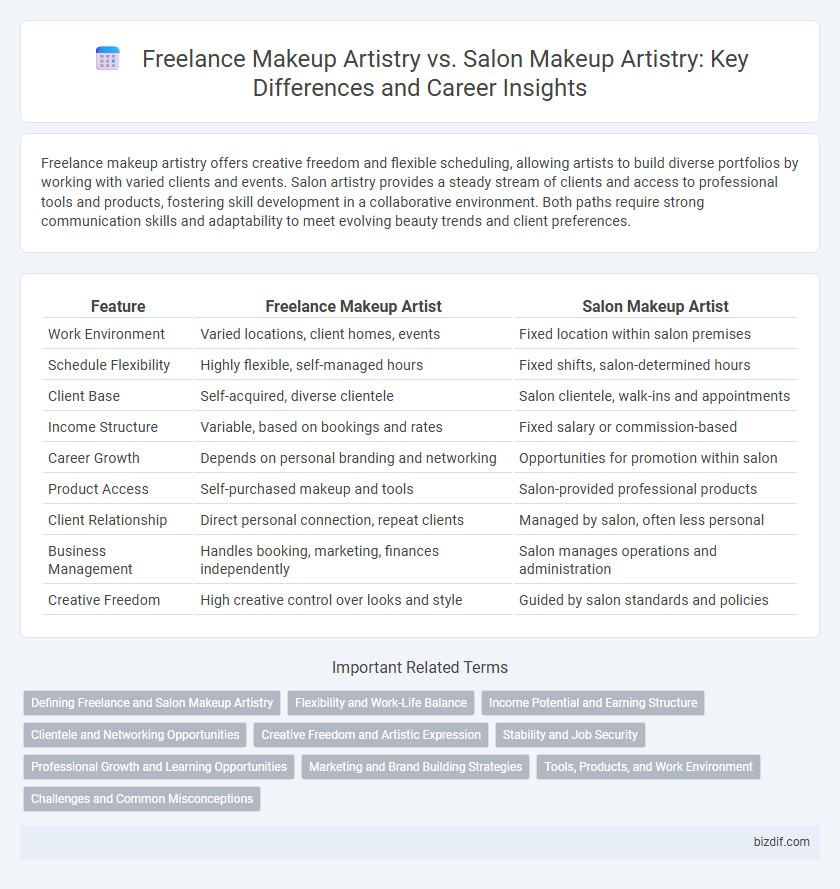Freelance makeup artistry offers creative freedom and flexible scheduling, allowing artists to build diverse portfolios by working with varied clients and events. Salon artistry provides a steady stream of clients and access to professional tools and products, fostering skill development in a collaborative environment. Both paths require strong communication skills and adaptability to meet evolving beauty trends and client preferences.
Table of Comparison
| Feature | Freelance Makeup Artist | Salon Makeup Artist |
|---|---|---|
| Work Environment | Varied locations, client homes, events | Fixed location within salon premises |
| Schedule Flexibility | Highly flexible, self-managed hours | Fixed shifts, salon-determined hours |
| Client Base | Self-acquired, diverse clientele | Salon clientele, walk-ins and appointments |
| Income Structure | Variable, based on bookings and rates | Fixed salary or commission-based |
| Career Growth | Depends on personal branding and networking | Opportunities for promotion within salon |
| Product Access | Self-purchased makeup and tools | Salon-provided professional products |
| Client Relationship | Direct personal connection, repeat clients | Managed by salon, often less personal |
| Business Management | Handles booking, marketing, finances independently | Salon manages operations and administration |
| Creative Freedom | High creative control over looks and style | Guided by salon standards and policies |
Defining Freelance and Salon Makeup Artistry
Freelance makeup artistry involves independent professionals who provide customized beauty services directly to clients, often working at various locations such as photoshoots, weddings, and fashion events, offering flexibility and tailored expertise. Salon makeup artistry, on the other hand, is typically performed within a fixed establishment where artists work as part of a team, delivering consistent services to walk-in or appointment-based clients within a structured environment. Both freelance and salon makeup artists require proficiency in techniques and trends, but freelance artists prioritize adaptability and personal branding while salon artists focus on maintaining client relationships and salon standards.
Flexibility and Work-Life Balance
Freelance makeup artists enjoy greater flexibility by choosing their own clients, schedules, and work locations, allowing for a personalized work-life balance that adapts to individual needs. Salon artists often follow fixed hours and appointments, which can limit spontaneity but provide consistent income and social interaction. Balancing creative freedom with stability is key when deciding between freelance and salon artistry careers.
Income Potential and Earning Structure
Freelance makeup artists often have higher income potential due to the flexibility to set their own rates and take on a variety of clients, including weddings, photoshoots, and special events. Salon makeup artists typically earn a fixed hourly wage or commission, resulting in more predictable but often lower overall earnings compared to freelancers. Freelancers must manage their own business expenses and client acquisition, while salon artists benefit from consistent clientele and employer-provided resources.
Clientele and Networking Opportunities
Freelance makeup artists often build diverse clientele by working across multiple venues and events, enhancing exposure to various customer demographics and personalized networking opportunities. Salon artists benefit from a steady stream of walk-in clients and established local relationships, aiding consistent business growth through repeat visits and referrals. Both paths offer unique networking advantages, with freelancers gaining broader industry connections and salon artists fostering loyal, community-based clienteles.
Creative Freedom and Artistic Expression
Freelance makeup artists enjoy greater creative freedom and artistic expression, tailoring unique looks for diverse clients and projects without salon restrictions. Salon artists might face brand guidelines and standardized styles that limit experimentation but benefit from steady clientele and collaborative environments. The balance between autonomy and structure shapes each artist's creative journey in the beauty industry.
Stability and Job Security
Freelance makeup artistry offers flexibility but lacks the consistent income and job security found in salon-based positions, where artists benefit from a steady client base and regular work hours. Salon artists often receive employee benefits and a predictable schedule, contributing to greater financial stability. Freelancers must rely on self-marketing and fluctuating client demand, which can lead to irregular earnings and less overall job stability.
Professional Growth and Learning Opportunities
Freelance makeup artists experience diverse professional growth by working with varied clients and projects, fostering adaptability and innovative techniques. Salon artists benefit from structured learning environments, mentorship, and consistent access to industry-standard tools and products, enhancing skill development. Both paths offer unique opportunities for specialization, with freelancers expanding networks independently, while salon artists gain credibility through established brand associations.
Marketing and Brand Building Strategies
Freelance makeup artists leverage social media platforms and personalized portfolios to create a distinct brand identity, targeting niche markets and direct client engagement. Salon artists benefit from the established reputation and foot traffic of a physical location, enhancing brand visibility through in-salon promotions and repeat customer relationships. Both approaches require consistent online presence and client testimonials to build credibility and expand market reach effectively.
Tools, Products, and Work Environment
Freelance makeup artists often invest in portable, versatile tools and high-quality products suited for diverse client needs and remote locations. Salon artists utilize larger, professional-grade equipment and a wider range of products in a controlled, well-equipped studio environment. The flexible work environment of freelance artistry allows customization, while salon artistry benefits from consistent infrastructure and collaborative resources.
Challenges and Common Misconceptions
Freelance makeup artists face the challenge of inconsistent income and the need for self-promotion, while salon artists often grapple with limited creative freedom and client dependency. Common misconceptions include the belief that freelance artistry is less professional and that salon work lacks entrepreneurial skills. Both paths require adaptability, strong client relationship management, and continuous skill development to succeed in the competitive makeup industry.
Freelance artistry vs Salon artistry Infographic

 bizdif.com
bizdif.com